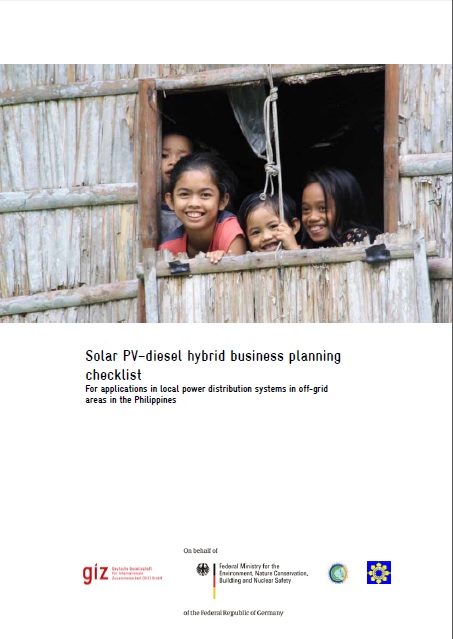Solar PV-diesel hybrid business planning checklist

Primarily based on diesel fuels, electricity generation in the Philippine off-grid areas is foremost an expensive undertaking. With true cost generation rates (TCGR) of diesel generators many times well over 20 pesos per kWh, the price for often poor and interrupting power supply is far higher than the average generation rate for on-grid electricity (5-6 PHP/kWh). Considering the high and continuously increasing cost of diesel-based electricity production, renewable energies (RE) represent an economic alternative for power supply in off-grid areas today and in the future.
RE investors and developers, when preparing investments in off-grid power supply in the Philippines are facing the challenge of improving availability and reliability of power supply, while reducing the overall cost of power generation by means of applying climate-friendly technologies. The economic rationale of introducing RE in off-grid power supply is among other things to help reducing the universal charge for missionary electrification (UCME), which is paid through a levy by grid-connected electricity consumers in the Philippines, and which has to cover the difference between the true cost of generation (TCGR) of NPC-SPUG and the subsidised approved generation rate (SAGR) charged to power consumers in off-grid areas through the local distribution networks.
Triggering investments in renewable energies in NPC-SPUG areas needs technically sound hybridization schemes and commercially viable, replicable business models. Therefore, the Department of Energy (DOE), the Climate Change Commission (CCC) and the Deutsche Gesellschaft für Internationale Zusammenarbeit (GIZ) as part of their joint “SupportCCC” project funded by the German Federal Environment Ministry under its International Climate Initiative developed the Solar PV-diesel-hybrid business-planning checklist. It is meant to provide a systematic approach on how to asses and develop PV diesel hybrid applications. The aim is to guide interested RE developers and energy sector stakeholders through the planning process of technically sound and commercially viable hybrid schemes.